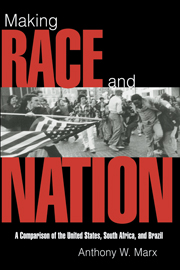Part One - Historical and Cultural Legacies
Published online by Cambridge University Press: 05 June 2012
Summary
PRIOR PRACTICES AND BELIEFS set the context in which post-abolition and post-colonial racial order was constructed. Analysts of Brazil's “exceptional” lack of legal racial domination and conflict have argued that Portuguese colonialism, Catholicism, more “humanitarian” slavery, and a greater physical mixing of populations preordained a later, more tolerant racial order. By implication, racial domination and conflict in South Africa and the United States (for all their differences) can then be explained by their alternative legacies of British or Dutch colonialism, Protestantism, harsh slavery, and lesser extent of miscegenation. In Part One, I assess these arguments, using trilateral comparisons to demonstrate that prior historical trajectories were not so fully determinant in their own right.
To simply refute the explanatory power of early history and culture as uncertain, and thereby to dismiss consideration of them, would be a serious mistake, inviting simple-minded, ahistorical conclusions. Instead, I will argue that colonialism, religious tradition, slavery, and miscegenation were later interpreted in particular ways to fit the political situations in each of the three cases under consideration. These interpretations were widespread in each culture, shaping perceptions of what and how post-abolition racial order could be and was constructed. And after that construction was refined, selective interpretations of past legacies justified the racial order that would come to prevail in each country.
- Type
- Chapter
- Information
- Making Race and NationA Comparison of South Africa, the United States, and Brazil, pp. 27 - 28Publisher: Cambridge University PressPrint publication year: 1997



